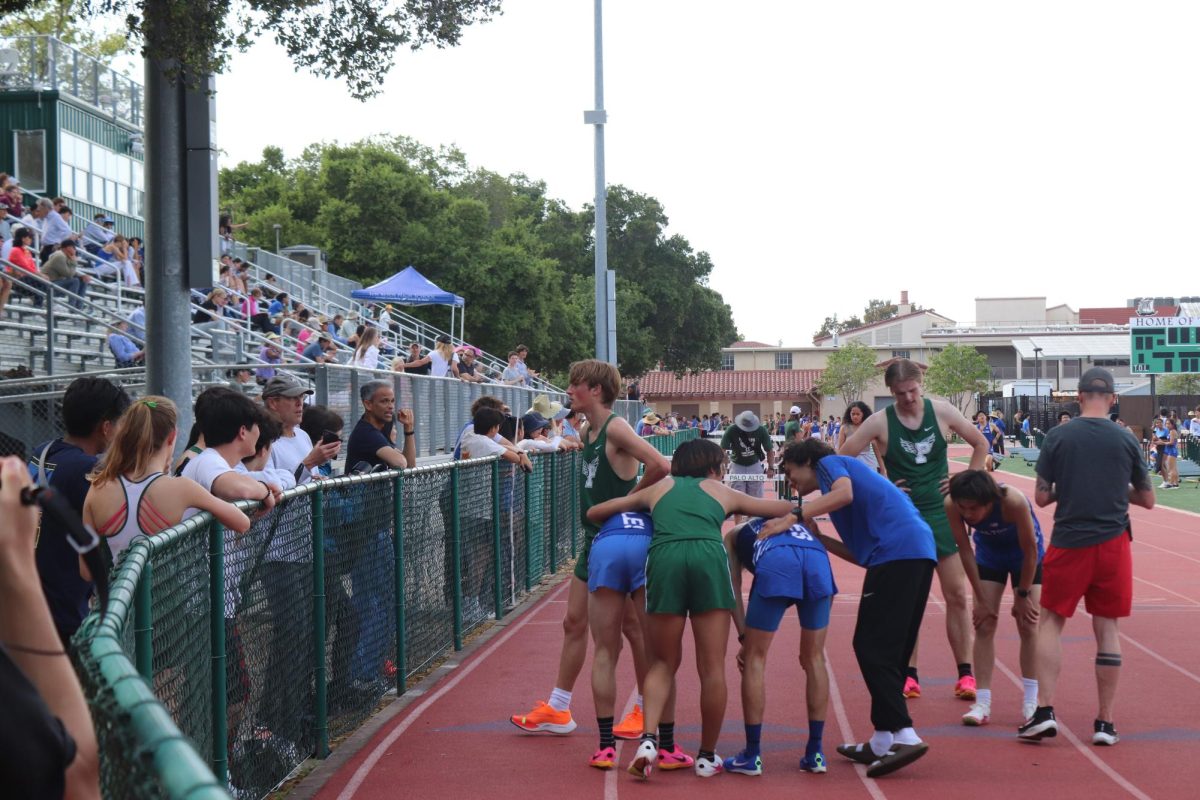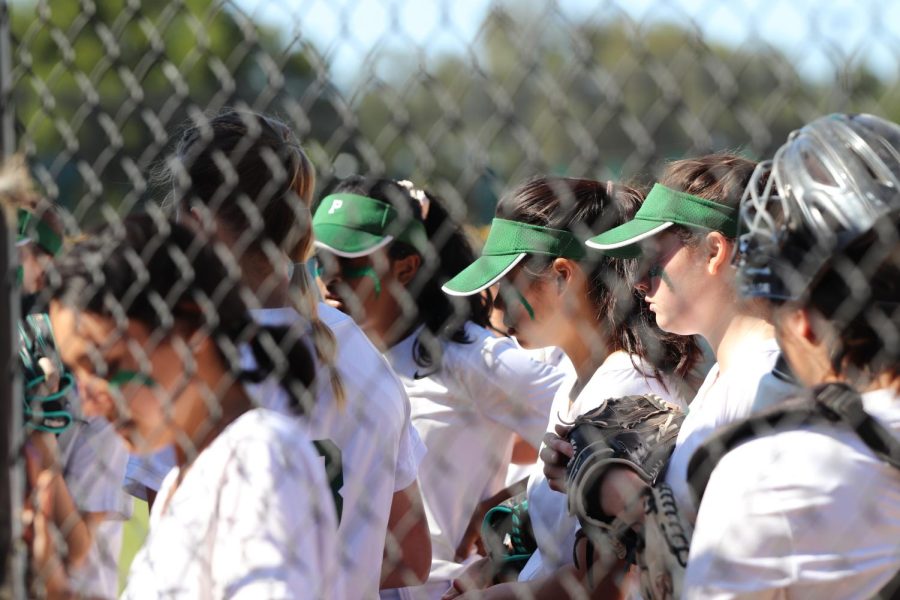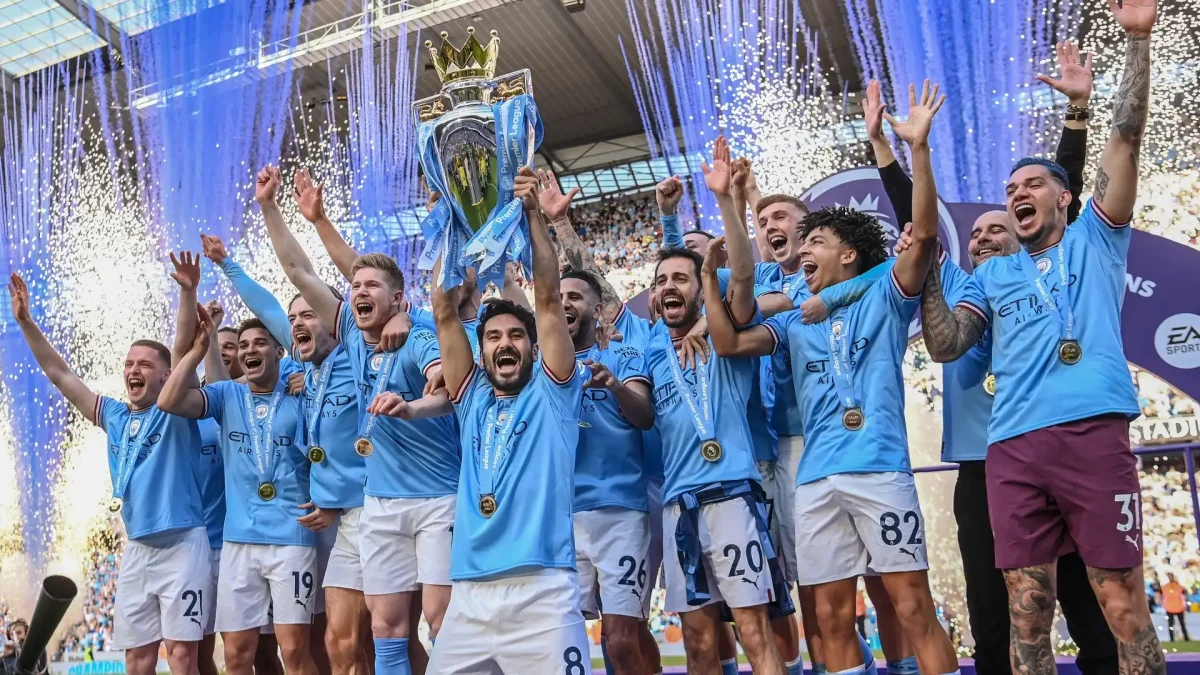Over Before It Started
While blue chip, Olympic level athletes across the nation felt pressure to succeed at the heart of their NCAA season, prominent colleges around the nation felt financial pressures from major budget cuts due to the pandemic. COVID-19 forced professional and college sport seasons, particularly the spring of 2020, to come to a screeching halt. Many college level athletes who have spent years perfecting their game were confronted with the news that their sport had been cut indefinitely.
October 12, 2020
Katherine Sung:
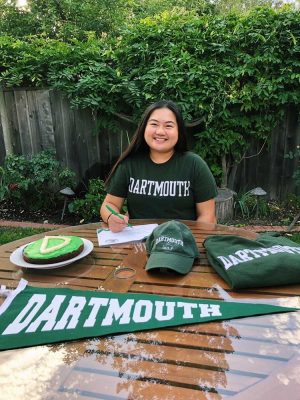
On July 9th, Paly alum Katherine Sung (‘20) woke up to an email relaying the news that her golf team had been cut from Dartmouth athletics. After committing in her junior year, Sung had her heart set on continuing the sport after high school.
Similar to other colleges, the news was broken to the athletes over a five to ten minute scripted zoom call. Sung’s coach reached out right after as he had only found out 15 minutes prior to the call. The athletes were confused since they were told the night before that practices could take place this semester. Everything came so sudden, not giving the athletes any time to process the devastating news, “we just felt super betrayed by the school that they would do something like this to us”.
In addition to cutting the mens and womens golf teams, swimming, diving, and men’s lightweight rowing were cut from Dartmouth athletics indefinitely. The athletes were told that their sports were cut based on financial issues, however, to Sung, their reasoning was inadequate and seemed to avoid all other questions. “they just kept changing their answers and they’re beating around the bush not giving us anything straightforward”
Days before the email was sent out, Sung received notice that the Hanover Country Club would be shutting down, meaning their home course would be gone forever. Dartmouth announced the closure to the public on July 9th due to a smaller budget and inconsistent use of the facility. Not having a practice course would have been a minor inconvenience to the team, however, an attempt to explore alternative options was not carried out by the athletic department.

Despite the closure of the course, the university still thought more budget cuts were necessary, taking down the golf teams along with it. It was never stated as to why these sports were chosen yet most of the athletes assumed it was because of how underrepresented they are in the media and they wanted to continue supporting sports with a larger following like basketball and football.
Sung planned to keep golf in her life through college and now is facing a difficult decision. Would it be worth it to stay at a school that won’t let her pursue her passion or transfer somewhere that would give her the opportunity to do so. “when the news came out it really made me reflect, why did I pick this school?”
When the news came out it really made me reflect, why did I pick this school?
— Katherine Sung
Before Sung verbally committed, she had to decide whether or not she wanted to continue her education at a prestigious university while playing golf or take time to further the recruitment process and enter as the class of 2025 somewhere else. Ultimately she chose to attend Dartmouth and is now reconsidering her decision.
Several of Sungs teammates have begun the transfer process to other universities who’s golf teams are still up and running this season and for seasons to come. Sung is also thinking about transferring after her first year at Dartmouth to further her golf journey.
Ben Felter:

Not many people get to attend their dream school. For Ben Felter (‘20), he dreamed of attending Stanford University but committing to the rowing team made it that much more special.
Felter received an automated email to the whole men’s rowing team saying they were going to have a meeting in 30 minutes.
The athletic director at Stanford, Bernard Muir, gathered all the teams onto a zoom. They assumed their season would just be cancelled due to COVID-19. “If that was the worst thing happening right now, it’d be pretty good,” Felter said. They guessed their season was being cancelled just not in the way they thought.
According to Felter, the call lasted for about 30 minutes and was a little speech saying “we’re cutting teams. We’re really sorry”. The call was not a regular zoom that we experience for class. It was more of a broadcast where the hosts could not see the athlete’s faces. “The way they broke the news just it didn’t feel as if they were showing much compassion,” Felter said. “Online they were able to kind of hide from us”.
The university said that they had exhausted all possible ways of saving the sports by trying to make up for the difference in money but their only solution was to cut the eleven sports. Felter thought the opposite. “If they tried everything, then they would have gone to alumni, the coaches would have tried to get funding, but it doesn’t seem like they’re all doing that now, but we wish it could have happened,” Felter said.
After the meeting, Felter was in disbelief. “I put so much time and effort, thinking rowing would be my whole sense of purpose in college,” Felter said. “To just see my whole future change in an instant like that it was pretty devastating”.
I put so much time and effort, thinking rowing would be my whole sense of purpose in college,
— Ben Felter
Felter not only grew his rowing skills, but his personal skills as well. “I love rowing…seeing myself grow not only physically but as a person,” Felter said. “And, you know, varsity status or not I still think that the effort and the work I’m putting in right now is teaching me a lot about valuable lessons about discipline and determination and hard work.”
Spending so many hours dedicated to training and competitions and having your life taken away would cause anyone to malfunction. Felter said everyone was devastated but after a week was when people started to differ. Some were able to find their motivation and go back to training while others weren’t able to get back on their feet. “I think it was hard for all of us, but the biggest thing is just finding a way to keep on going even though everything seems like it’s stacked up against us right now,” Felter said.
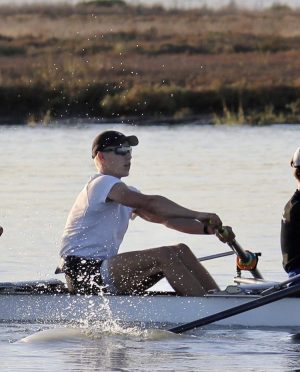
Felter believes that Stanford needs to see the value in sports such as rowing that might not bring in as much money as football and basketball. “The people I’ve met in my time rowing have been some of the most amazing people I’ve ever met and that’s part of what has kept me in the sport,” Felter said. “And to see that to like to see our team disbanded and see all these people lose that community are just amazing people that they’re a part of”.
Stanford athletics have produced and been home to many olympians. In 2016, Stanford had the most college athletes competing than any other school with 30 athletes. Stanford overall has won 270 olympic medals. Of those 270, men’s rowing has brought in eight gold, one silver, and four bronze medals. Why would Stanford cut sports that have given them Olympic glory?
“I think it’s very sad that now Stanford has set somewhat of a precedent across multiple universities that Olympic sports may not be as important as sports like football and basketball that are bringing in enough money for university,” Felter said. “I think that Stanford especially has created a name for themselves as like this Olympic athlete producing university
they may be losing that by cutting the majority of their Olympic sports”.
Felter is leaning towards continuing his academic career at Stanford versus transferring to pursue rowing. “Stanford’s been my dream school for longer than I’ve been rowing. And I think that there’s a good chance I would regret leaving,” Felter said.
If an athlete doesn’t get recruited to play at a varsity level, they can still pursue their sport just at a club level. The problem with dropping from a varsity level to club, is the decrease in competition. Felter doesn’t want to feel that drop. “Part of the culture of rowing is pursuing the highest level that you can and it’s disappointing when you’re restricted,” Felter said.
A lot of athletes have struggled with motivation after the announcement because they are unsure of whether they should continue to train. Felter experienced drastic fluctuations in his motivation. One week, he was willing to push himself to his limits but other weeks he had no motivation to train.
Felter will have the chance to row for Stanford during the 2020-2021 season, but after that, the future is unclear. Maybe, after COVID-19 slows down, the University will be able to reinstate these sports and let the athletes continue the pursuit of their sports.
Sarah Brownstein:
Sarah Brownstein (‘19) has a little bit of a different story. Brownstein committed to Towson University with the hopes of continuing her gymnastics career. Unfortunately, in January, she realized her coach was unlikely to give her the opportunity to compete and decided to look at other schools that would fit personally as well as academically. Brownstein decided to transfer to William and Mary for the 2020 season.
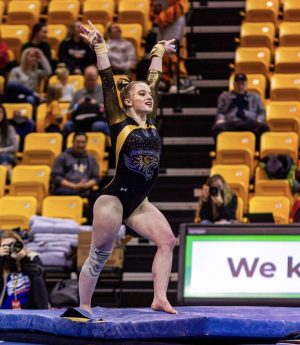
The team, scheduled to have practice at 3 pm, received a text from their coach at 1:15 pm saying practice was cancelled and a meeting was being held by the athletic director. Upon finding out that multiple teams were attending the meeting, Brownstein prepared for the worst. William and Mary cut six sports due to financial issues: men’s and women’s gymnastics, men’s and women’s swimming, men’s outdoor track and field, and volleyball. These sports will be able to compete in their 2020-2021 seasons. This decision will affect 118 student athletes and 36 coaches.
“In the meeting the AD read to us from a script, told us she was cutting our teams, and then left the meeting within about 5 minutes without saying goodbye,” Brownstein said.
Not one for crying, Brownstein says she was devastated, shocked, and in tears before the zoom call even ended. This announcement was very unexpected to Brownstein.
“I honestly believed that of all schools I was looking at, William and Mary was very unlikely to get the program cut,” Brownstein said.
I honestly believed that of all schools I was looking at, William and Mary was very unlikely to get the program cut
— Sarah Brownstein
Similar to Brownstein, many of her teammates were upset as well as angry. They believe the department could have handled the situation differently and didn’t necessarily have to cut the program along with the 6 other sports.
She believes the cut was unfair because well funded sports such as football have not had the best seasons. “There are 7 million dollars spent each year on football,” Brownstein said. “The football team at this school isn’t great and wouldn’t be negatively affected if a fraction of their budget was cut to allow my team and the other 6 teams to stay.”
All the cut sports have had successful previous seasons. William and Mary’s Men Swimming team has won 64 CAA Championship Relays and 11 CAA Coaches Of the Year. Their men’s gymnastics team has been named the College Men’s Gymnastics National Academic Champions eight times, more than any NCAA team in the country. The Women’s gymnastics team was the ECAC champions in 2014.
Brownstein feels redistributing the money among the sports and making every sport have a slightly lower budget would have been a better solution.
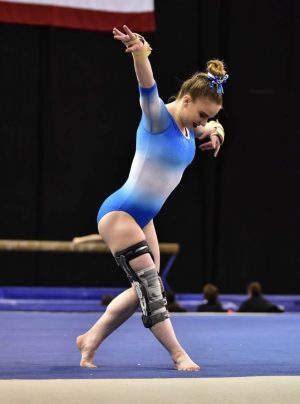
The one question these athletes have to answer is whether or not they will stay at their current school and finish their degree or transfer in the pursuit of their sport. Brownstein has no idea. “I love it here and I would really like to stay, but I am also not ready to be done with gymnastics,” Brownstein said.
Similar to Stanford Rowing, many petitions have been made in an attempt to continue the season. One of the alumni made a petition to bring back all seven sports and the petition has received over 16,000 signatures in a week. The team is also looking at potential ways to raise money.
Unlike Felter, Brownstein will transfer if gymnastics does not get reinstated. “ I will be doing gymnastics next year,” Brownstein said. “I would like that to be D1 at William and Mary but if not, I will either transfer or find another way to continue the sport”.
With all the uncertainty, the only thing Brownstein can do is to continue training day by day and make every day the best it can be. “ I don’t know what’s happening with my ability to train, so I am making sure to go all out every second of every day and do the absolute best that I possibly can,” Brownstein said.
The Activitsts:
Locally, Stanford’s oldest women’s sport, field hockey, was one of the eleven teams cut. Because of this devastating news, Elise Ogle, a prominent Stanford Field Hockey alumna, began @SaveStanfordFieldHockey on Instagram, Facebook, and Twitter. Ogle graduated from Stanford in 2015 and has worked as a volunteer for the program during their Fall season, operating their video review system or filming games. Knowing that Stanford would be impacting hundreds of thousands of young girls and women aspiring to play at the next level, Ogle began to advocate for the field hockey team, trying to gain recognition for the majorly successful team who have won numerous American East Titles and have produced USA gold winners and All-Americans.
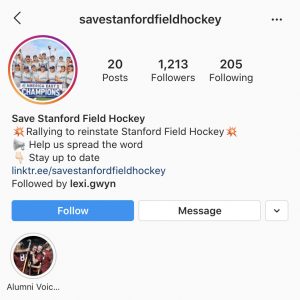 “After processing my initial emotions I channeled my energy into movement. With this movement we are seeking solutions and support to find a way to keep the program at Varsity status for the indefinite future.”
“After processing my initial emotions I channeled my energy into movement. With this movement we are seeking solutions and support to find a way to keep the program at Varsity status for the indefinite future.”
Ogle had received an amazing education and support system from Stanford, and is devastated for the loss of opportunity that West Coast players had before.
“When I was a sophomore at Stanford, my best friend and roommate was lost to suicide. While I myself struggled with depression at the time, the field hockey team, community, and the coaches were my support system through it all and I would not be where I am today without them. I was devastated by the university’s announcement and the realization that young women in the future wouldn’t have this wonderful opportunity that I had or the support system that I had while at such a challenging school,” Ogle said.
As news spread that Stanford would be eliminating eleven sports, Ogle became heartbroken, upset, and motivated to help reverse the action.
“I was heartbroken– heartbroken for the current team, the coaches, the incoming freshman, the recruits who have all had their plans turned upside down. I was angry because of the way in which the university announced the decision, on a zoom call with the team just a few minutes prior to a public announcement that made prominent their statement that “this decision is final.”
Ogle expressed frustration as well, knowing that Stanford had not used its prosperous resources and alum to its fullest potential to help support the teams.
“The athletics department said they explored all options and this was the only path forward but that is just not true. They did not reach out to our most prominent program donors. They did not do their due diligence in understanding the devastating impact this decision would have on all of California and West Coast field hockey,”
Lexi Gwyn, a current senior as well as the varsity field hockey team captain here at Paly, was also disappointed in Stanford’s decision to cancel their women’s field hockey program. Growing up in Australia where field hockey was a popular sport, Gwyn was exposed to the sport at an early age. After moving to the US, Lexi began to immerse herself in the small field hockey community in California.
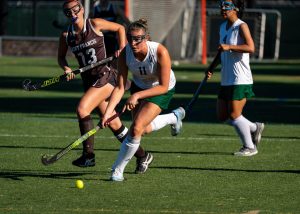
“One of the first things I did when I moved to the US was go to Stanford’s summer field hockey camp. I knew members of the Stanford field hockey team before I knew anyone that was going to my school. Field hockey is something that connected me to Australia, and getting to play field hockey for the first time after moving to a totally new country was really calming for me.”
Lexi looked up to the women on the Stanford Field Hockey team, using them as an inspiration to improve her own skill sets.
“My mom and I used to go watch all the home games at the Stanford turf. We would watch in awe at the level of skill, and it made me want to be a better player, I wanted to be like them.”
Lexi’s reaction to the cancellation of Stanford Field Hockey was similar to Ogle. Disappointment, anger, sadness and frustration were some of the emotions the two shared.
“The cancellation of the Stanford Field Hockey team really crushed my spirit. For the first couple of years that I lived here, I received statements almost every day like “field hockey isn’t a sport” “field hockey is gay” “field hockey is a hobby” and “only lesbians play field hockey.” Sure, they were jokes, but it made me feel like the sport I put so much work into and loved so deeply didn’t matter. The passion and drive I felt when I was on the field was fake, meaningless.”
The cancellation of field hockey only brought back the bitter memories of her favorite sport being scrutinized.
When the Stanford program got canceled, along with 10 other varsity sports, it wasn’t a surprise what teams they had cut. Was it football? No. Was it swimming? No. Was it diving? Hell no. Was it soccer? Nope. It brought back all that pain from those first few years, and I felt that pain for every girl on the Stanford team, who had busted their asses to get where they are. Some of their players were members of the US National team, the US indoor team, they were nationally ranked, and as a team they had won countless titles.”
The prominent accolades and hard work these women put in are not recognized by the cancellation of the team, Lexi expressed.
“And yet, they were told (not directly of course) that their sport didn’t matter enough, didn’t bring in enough revenue, and didn’t get enough support to stay.”







